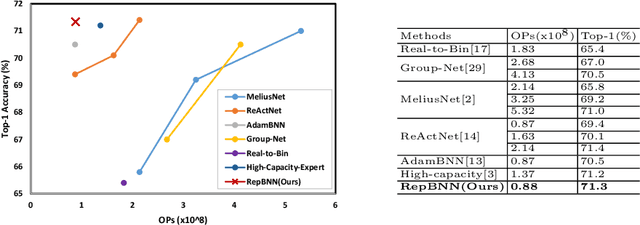Xulong Shi
Expanding-and-Shrinking Binary Neural Networks
Mar 31, 2025Abstract:While binary neural networks (BNNs) offer significant benefits in terms of speed, memory and energy, they encounter substantial accuracy degradation in challenging tasks compared to their real-valued counterparts. Due to the binarization of weights and activations, the possible values of each entry in the feature maps generated by BNNs are strongly constrained. To tackle this limitation, we propose the expanding-and-shrinking operation, which enhances binary feature maps with negligible increase of computation complexity, thereby strengthening the representation capacity. Extensive experiments conducted on multiple benchmarks reveal that our approach generalizes well across diverse applications ranging from image classification, object detection to generative diffusion model, while also achieving remarkable improvement over various leading binarization algorithms based on different architectures including both CNNs and Transformers.
RepBNN: towards a precise Binary Neural Network with Enhanced Feature Map via Repeating
Jul 19, 2022



Abstract:Binary neural network (BNN) is an extreme quantization version of convolutional neural networks (CNNs) with all features and weights mapped to just 1-bit. Although BNN saves a lot of memory and computation demand to make CNN applicable on edge or mobile devices, BNN suffers the drop of network performance due to the reduced representation capability after binarization. In this paper, we propose a new replaceable and easy-to-use convolution module RepConv, which enhances feature maps through replicating input or output along channel dimension by $\beta$ times without extra cost on the number of parameters and convolutional computation. We also define a set of RepTran rules to use RepConv throughout BNN modules like binary convolution, fully connected layer and batch normalization. Experiments demonstrate that after the RepTran transformation, a set of highly cited BNNs have achieved universally better performance than the original BNN versions. For example, the Top-1 accuracy of Rep-ReCU-ResNet-20, i.e., a RepBconv enhanced ReCU-ResNet-20, reaches 88.97% on CIFAR-10, which is 1.47% higher than that of the original network. And Rep-AdamBNN-ReActNet-A achieves 71.342% Top-1 accuracy on ImageNet, a fresh state-of-the-art result of BNNs. Code and models are available at:https://github.com/imfinethanks/Rep_AdamBNN.
 Add to Chrome
Add to Chrome Add to Firefox
Add to Firefox Add to Edge
Add to Edge